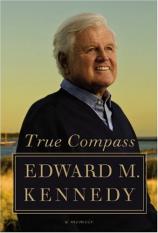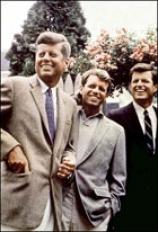True Compass: A Memoir
Review
True Compass: A Memoir
With memories of Ted Kennedy’s final illness, death and
elaborate funeral still fresh in our minds, it will be hard for
anyone, friend or foe, to approach this book as simply another
politician’s memoir. The passions he evoked are still raw.
TRUE COMPASS becomes not just a book, but a public event.
The memoir has two main strands. First, there is the family
saga, told with a kind of rosy-hued nostalgic glow: the vast
influence of family patriarch Joseph P. Kennedy Sr. on his nine
children, the intense rivalry and enduring affection among them,
the zest for public service --- and, of course, the relentless
series of family tragedies that befell them, starting with the
death of brother Joseph in World War II, the assassinations of
brothers John and Robert, the mental illness of sister Rosemary,
and the sad succession of accidents (plane crashes in particular)
that have dogged the family down to the present day.
The other strand is Kennedy’s unapologetic liberalism. It
earned him the admiration of many over his 47 years in the U.S.
Senate and the furious hatred of others (at least one detractor
during the 2008 campaign bluntly branded him a
“murderer”). Here he makes his case as an advocate for
civil rights, health care, working people, minorities and activist
government in general. He writes of his “personal distaste
for self-justification,” but inevitably there is a strain of
that very thing in his narrative. It is hard to see how he could
have avoided it.
Kennedy is candid --- up to a point --- about his personal life.
There are passing references to excessive drinking, a dryly factual
account of his divorce and a glowing tribute to the woman who
became his second wife. His account of the fateful 1969 events on
Chappaquiddick Island repeats the version he told at the time; he
describes it as an accident with consequences that he deplores and
for which he accepts some responsibility. Nothing really new
there.
The Kennedy family, of course, was (and still is) immensely
wealthy. Kennedy takes this pretty much for granted, dropping
casual phrases like “dad always bought his horses in
Ireland” as though they were trivial family chitchat. The
jaunts to Europe and vacations in Hawaii are simply recorded
without fanfare as the normal doings of the very rich.
On the political side, there are occasional juicy nuggets. As
expected, Kennedy gives poor marks on policy to Ronald Reagan and
George W. Bush. But he is also highly critical of Jimmy Carter
(“a difficult man to convince --- of anything… He did
not really listen; he loved to give the appearance of
listening”), plays down the much-touted bitterness between
Robert Kennedy and Lyndon Johnson, and deplores the lasting public
image of Robert as ruthless. Among several neatly told stories, the
best is a wryly hilarious account of a failed effort to discuss
with Reagan relief for the shoe manufacturing industry. Reagan
rambles on about shoes in general, avoiding the issue at hand until
time is up and the utterly flummoxed group of senators is ushered
out of the Oval Office, their message undelivered.
One Kennedy family factoid that will surprise some and appall
others: Kennedy says there was some sentiment for putting his
father on the Democratic ticket for vice-president in 1936. One can
almost hear FDR, who came to despise the man, rolling over in his
grave.
Inevitably, TRUE COMPASS will be seen as a heavy artillery salvo
in the current battle over health care reform. Kennedy labels that
issue “the cause of my life” and comes out forcefully
for a major role of government in the final product. Liberal
Democrats in the Senate have already adopted him as their patron
saint; they want to name their proposed bill in his honor. Kennedy
revisits the failed Democratic attempt to tackle the issue in 1994,
and highlights aspects of the opposition that have resurfaced
unchanged in the current debate.
The writing is smooth and graceful, rising frequently to real
eloquence. Kennedy worked with a collaborator, Ron Powers, whose
name does not appear on the title page but is generously credited
in the back-of-the-book acknowledgements. Powers may have
contributed to the book’s literary polish, but he also did a
fine job of capturing the thought and personal commitment of Edward
M. Kennedy.
No matter how much you loved or hated Ted Kennedy, TRUE COMPASS
is well worth reading --- whether you give it a place of honor on
your shelves or toss it at the nearest wall.
Reviewed by Robert Finn (Robertfinn@aol.com) on January 23, 2011
True Compass: A Memoir
- Publication Date: September 14, 2009
- Genres: Nonfiction
- Hardcover: 532 pages
- Publisher: Twelve
- ISBN-10: 0446539252
- ISBN-13: 9780446539258




